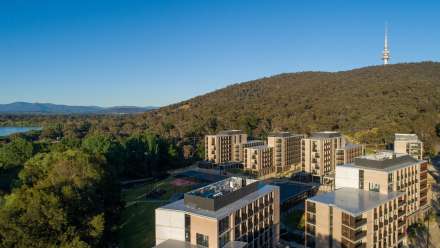Is noise pollution causing stress for primates?
There are many variables that could be affecting gibbon behaviour and stress levels in addition to, or instead of, logging
Primates face several threats, including hunting, habitat loss, and forest degradation and fragmentation, but few studies have looked at the impact of noise from humans.
Sarah McGrath, PhD candidate at the ANU School of Archaeology and Anthropology, is investigating the impacts of logging and hunting pressure on the endangered northern yellow-cheeked crested gibbon Nomascus annamensis in Veun Sai-Siem Pang National Park (VSSP) in Cambodia.
It's data-heavy work and she has worked closely with the ANU Statistical Support Network (SSN) for support in analysing the field data she and her team have gathered.
"I was lucky enough to spend two, six-month periods in the national park and surrounding villages collecting data," Sarah says.
"My team and I collected gibbon faecal samples, behavioural data and GPS data to assess how chainsaw noise impacts the gibbons' behaviour and cortisol levels. We also completed gibbon auditory surveys and logging surveys to determine the relationship between illegal selective logging and the density of gibbons in VSSP."
As well as quantitative data, Sarah and her team collected qualitative data through interviews with local people in villages surrounding VSSP, to assess the hunting pressure on this gibbon species and other primates in the park.
"Statistics was a key part of my thesis, and my research questions would not have been answered without data analyses," Sarah says.
"There were many variables that needed to be considered that could be affecting gibbon behaviour and stress levels in addition to, or instead of, logging."
Sarah says that as it's not possible to control all variables while working in the field, she ended up with large datasets and complex models that incorporated both random and fixed effects.
"It was crucial that I understood the limits of my data and did not overfit my models when including these variables," she says.
"Whilst I had taken a statistics course and completed data analyses during my Master of Science (Zoology) degree, every project is unique with different research questions and types of data with different sample sizes.
"With the help of the SSN, data analys\is has gone from one of my least favourite parts of research to one of my favourites."
Nearly all gibbon species are listed as endangered or critically endangered on the International Union for Conservation of Nature (IUCN) Red List of Threatened Species.
"My research is important for future conservation of N. annamensis, a species that was only described in 2010," she says.
"It provides crucial information on the ranging behaviour and home range use of the species, as well as insight into the impacts of logging on the gibbons' behaviour and stress levels, the hunting pressure on the species and other primates, and gibbon density in VSSP."
Through working with the SSN team, Sarah says her statistical skills have improved.
"The statisticians are extremely knowledgeable and helpful - they taught me about various data analyses in a way that was easy to understand and free from jargon," she says.
To make the most out of appointments with statistical consultants, Sarah suggests that students should come prepared, having thought about the data they have and how they may analyse it to answer their research aims.
"There is so much information about data analyses available online and even in similar studies to my own, many authors analyse their data differently," Sarah says.
"As a result, it can be hard to understand if one approach is better than another and if an approach is even suitable for your dataset."
Sarah says the SSN team helped her learn through brainstorming ideas and providing valuable insight into different models, and into the power of her data given its type, sample sizes and models used.
"They not only provided advice on the best way to analyse my data to answer my research aims, but also helped me understand why it was better to do it that way compared to other methods, and I am a better researcher for it."
For more information on the Statistical Support Network, call 6125 0562, email ssn@anu.edu.au or visit the website here.


